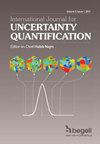Learning a class of stochastic differential equations via numerics-informed Bayesian denoising
IF 1.8
4区 工程技术
Q2 ENGINEERING, MULTIDISCIPLINARY
International Journal for Uncertainty Quantification
Pub Date : 2024-07-01
DOI:10.1615/int.j.uncertaintyquantification.2024052020
引用次数: 0
Abstract
Learning stochastic differential equations (SDEs) from observational data via neural networks is an important means of quantifying uncertainty in dynamical systems. The learning networks are typically built upon denoising the stochastic systems by harnessing their inherent deterministic nature, such as the Fokker-Planck equations related to SDEs. In this paper we propose the numerics-informed denoising by taking expectations on the Euler-Maruyama numerical scheme of SDEs, and then using the Bayesian neural networks (BNNs) to approximate the expectations through variational inference on the weights' posterior distribution. The approximation accuracy of the BNNs is analyzed. Meanwhiles we give a data acquisition method for learning non-autonomous differential equations (NADEs) which respects the time-variant nature of NADEs' flows. Numerical experiments on three models show effectiveness of the proposed methods.通过数值信息贝叶斯去噪学习一类随机微分方程
通过神经网络从观测数据中学习随机微分方程(SDE)是量化动态系统不确定性的重要手段。学习网络通常是通过利用随机系统固有的确定性(如与 SDE 相关的 Fokker-Planck 方程)对其进行去噪而构建的。在本文中,我们提出了数值信息去噪方法,即对 SDE 的 Euler-Maruyama 数值方案进行期望,然后使用贝叶斯神经网络(BNN)通过对权重后验分布的变分推理来近似期望。分析了贝叶斯神经网络的近似精度。同时,我们给出了一种学习非自主微分方程(NADEs)的数据获取方法,该方法尊重 NADEs 流量的时变性。对三个模型的数值实验表明了所提方法的有效性。
本文章由计算机程序翻译,如有差异,请以英文原文为准。
求助全文
约1分钟内获得全文
求助全文
来源期刊

International Journal for Uncertainty Quantification
ENGINEERING, MULTIDISCIPLINARY-MATHEMATICS, INTERDISCIPLINARY APPLICATIONS
CiteScore
3.60
自引率
5.90%
发文量
28
期刊介绍:
The International Journal for Uncertainty Quantification disseminates information of permanent interest in the areas of analysis, modeling, design and control of complex systems in the presence of uncertainty. The journal seeks to emphasize methods that cross stochastic analysis, statistical modeling and scientific computing. Systems of interest are governed by differential equations possibly with multiscale features. Topics of particular interest include representation of uncertainty, propagation of uncertainty across scales, resolving the curse of dimensionality, long-time integration for stochastic PDEs, data-driven approaches for constructing stochastic models, validation, verification and uncertainty quantification for predictive computational science, and visualization of uncertainty in high-dimensional spaces. Bayesian computation and machine learning techniques are also of interest for example in the context of stochastic multiscale systems, for model selection/classification, and decision making. Reports addressing the dynamic coupling of modern experiments and modeling approaches towards predictive science are particularly encouraged. Applications of uncertainty quantification in all areas of physical and biological sciences are appropriate.
 求助内容:
求助内容: 应助结果提醒方式:
应助结果提醒方式:


